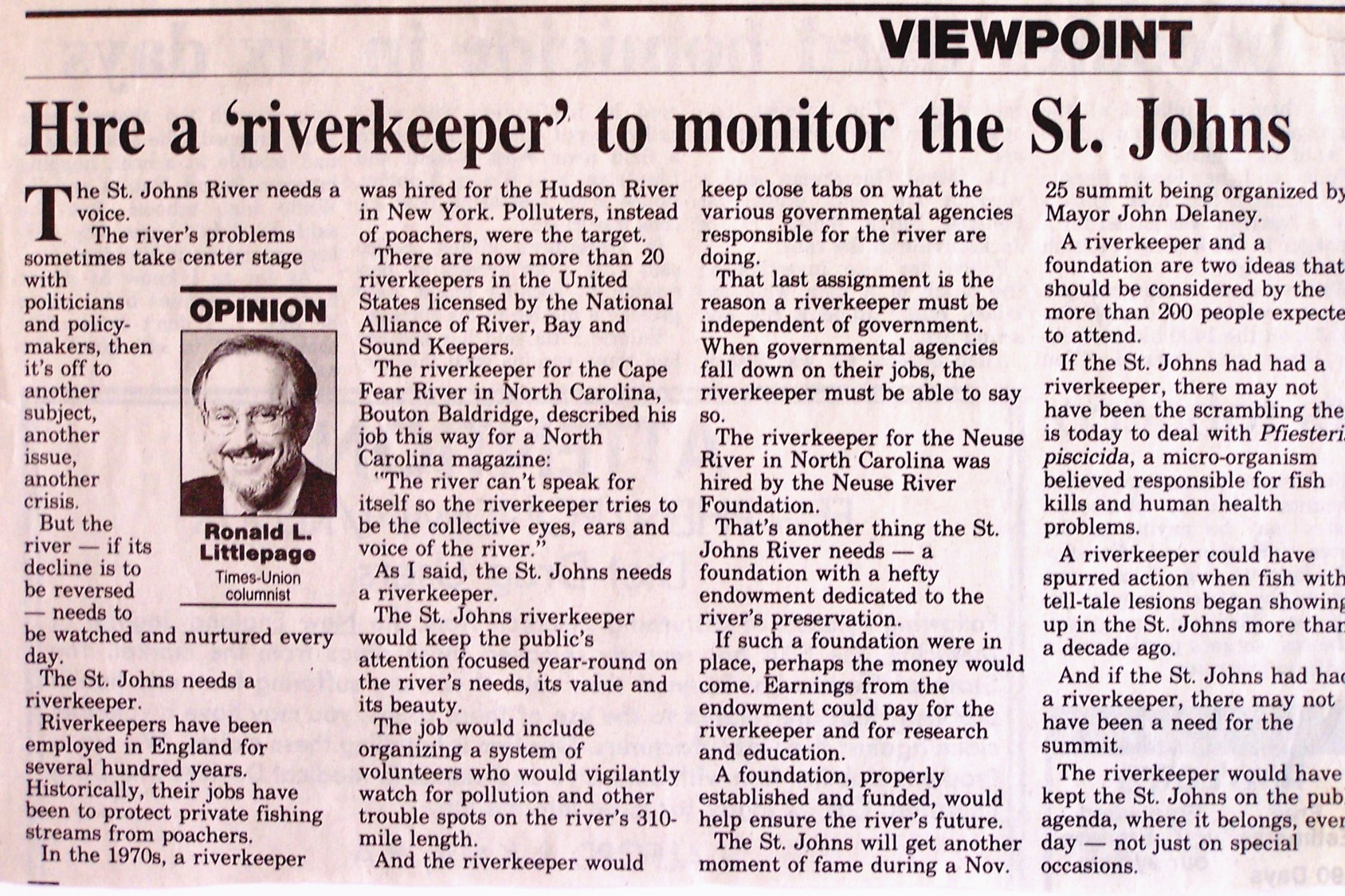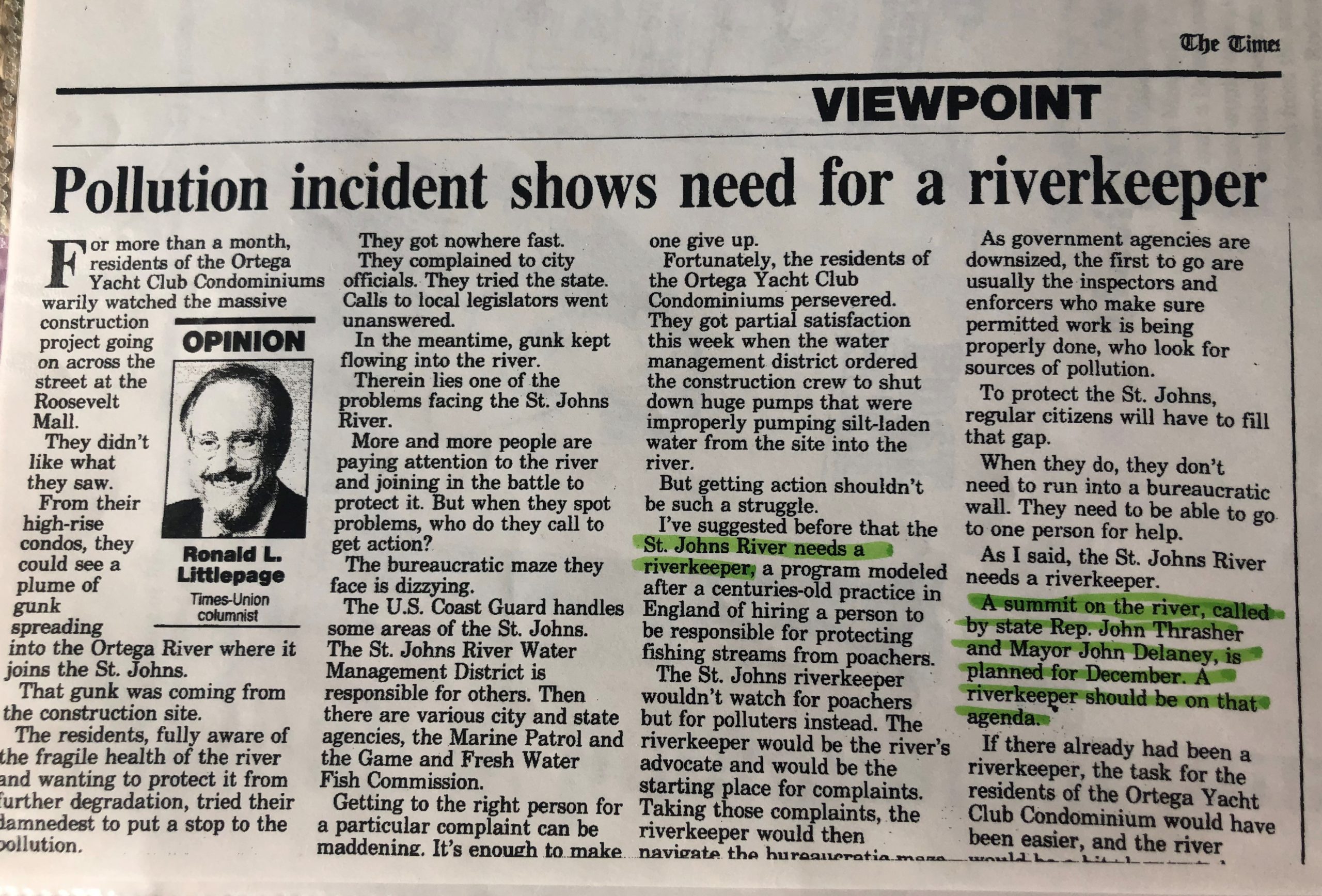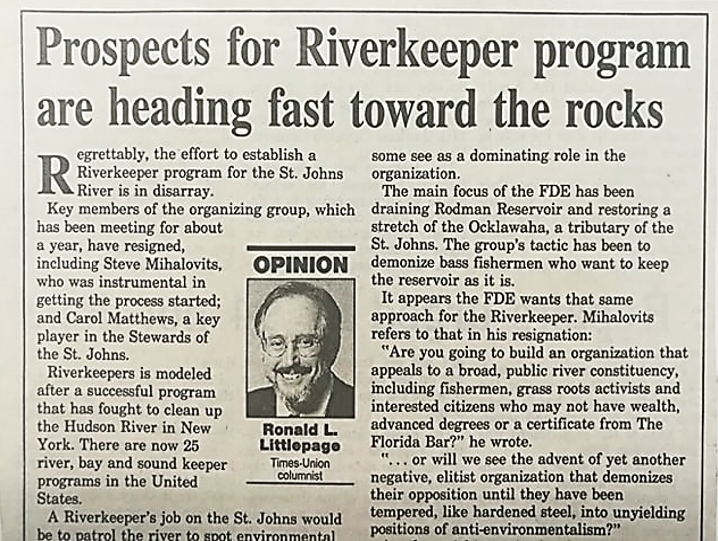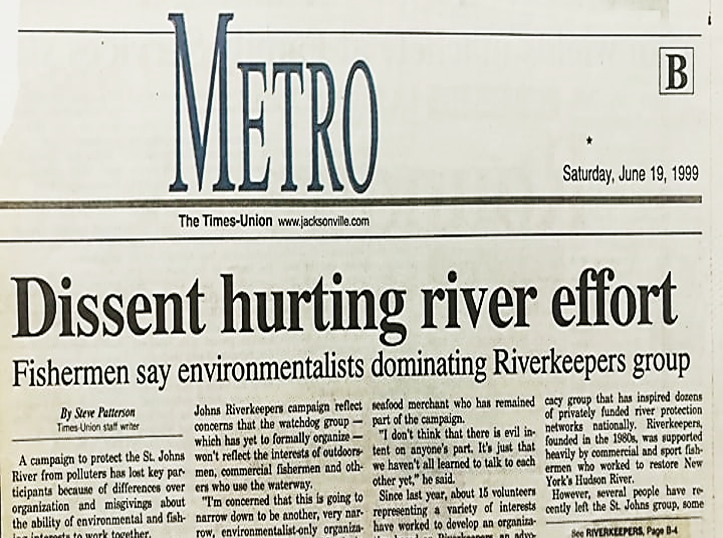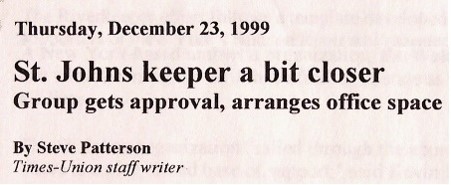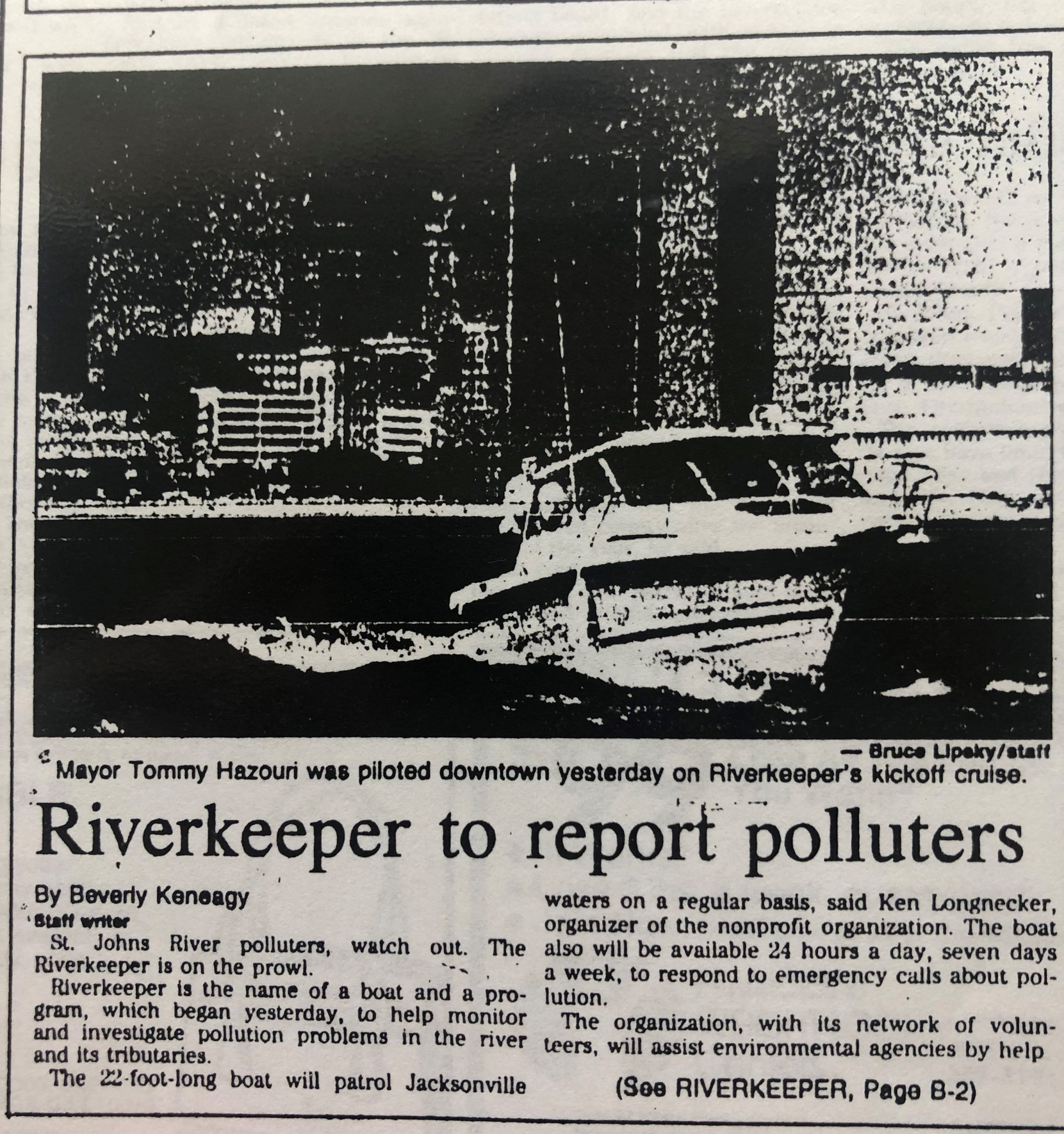25 Years of St. Johns Riverkeeper
Join Our Movement for Clean Water
Our work as an independent voice for the St. Johns River is made possible by financial support from you and hundreds of other concerned citizens. Your donation will allow us to leave a lasting legacy as we accomplish our mission “to defend the St. Johns River and advocate for its protection.”
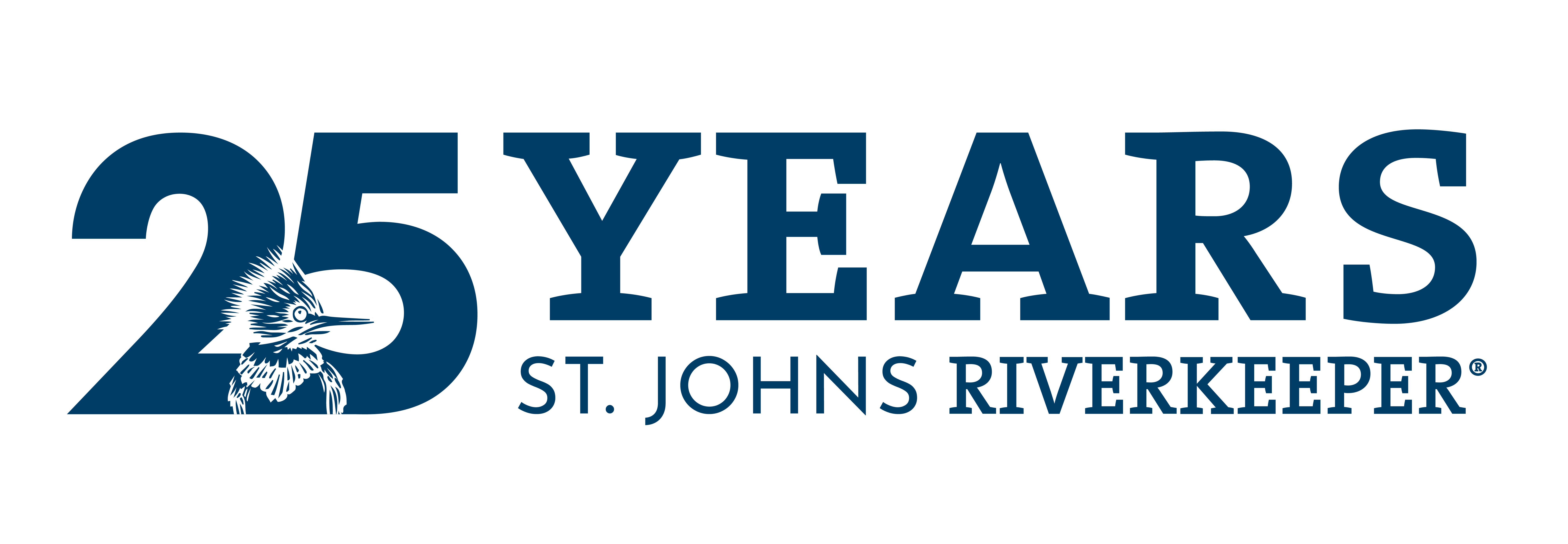
St. Johns RIVERKEEPER is a community-supported nonprofit dedicated to defending and protecting the St. Johns River and its watershed.
For 25 years, we have accomplished our mission by:
- Investigating pollution problems.
- Holding polluters accountable.
- Advocating for protective policies and solutions.
- Educating youth about the river.
- Mobilizing concerned citizens to take action.
25 Years of Advocacy
In the late 1990s, a group of concerned local citizens recognized the need for an independent watchdog group for the St. Johns River to hold regulatory agencies and polluters accountable. They were frustrated by the declining health of the river and the lack of progress by state agencies to resolve pollution problems. This visionary team of citizen advocates decided to take back their river by launching St. Johns Riverkeeper in 2000. 25 years later we remain united around one common goal – protecting the St. Johns River.
St. Johns Riverkeeper continues to provide the St. Johns with a powerful voice. Over the past quarter-century, we have made great strides for the river. But there is much left to be done. As we celebrate our accomplishments, we must also look toward the future and how we can create a healthy river for us all over the next 25 years.
We need you to join the movement. Together, we will continue to make progress toward a thriving St. Johns River watershed. For the River. For us all.
25 Years of Community Outreach and Education
Boat Trips
Boat Trip Passengers
Cleanups
Education Programs
Youth Reached
Years For the River
Your St. Johns Riverkeeper, Then and Now
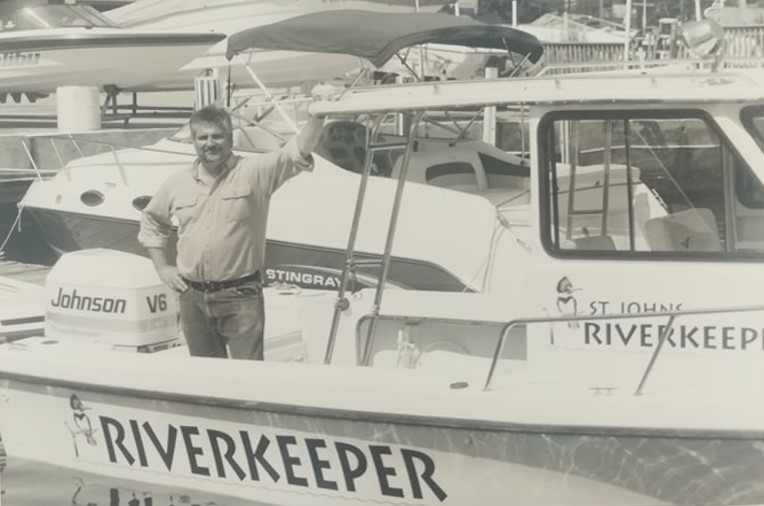
Mike Hollingsworth
April 2001
Hired to be the first St. Johns Riverkeeper
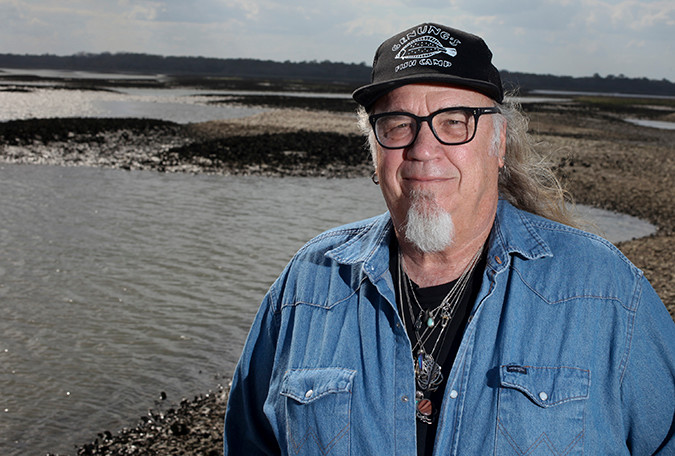
Neil Armingeon
February 2003
Becomes the second St. Johns Riverkeeper

Lisa Rinaman
February 2012
Your current St. Johns Riverkeeper
“Serving as your St. Johns Riverkeeper is an honor and a humbling responsibility. Fortunately, the river is blessed with water warriors united to protect the river we love for future generations. Together, we are making a difference.”
25 Years of Milestone Moments
SAVe Our River’s Grasses
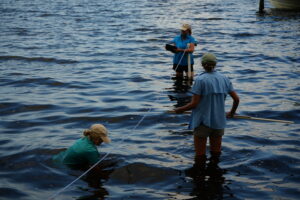 In response to the significant decline of submerged aquatic vegetation (SAV) in the St. Johns River following Hurricane Irma in 2017, St. Johns Riverkeeper launched a five-year SAVe Our River’s Grasses Expedition (2023-2027). We survey 14 sites along an 80-mile stretch of the river between Doctors Lake in Clay County and Lake George in Putnam County to gather data and connect with local residents as we work toward solutions to help bring back this vital habitat within our river. So far we have completed six field visits. Learn more and view our Expedition Reports.
In response to the significant decline of submerged aquatic vegetation (SAV) in the St. Johns River following Hurricane Irma in 2017, St. Johns Riverkeeper launched a five-year SAVe Our River’s Grasses Expedition (2023-2027). We survey 14 sites along an 80-mile stretch of the river between Doctors Lake in Clay County and Lake George in Putnam County to gather data and connect with local residents as we work toward solutions to help bring back this vital habitat within our river. So far we have completed six field visits. Learn more and view our Expedition Reports.
Clean Water Act 404 Wetlands Permitting Federal Lawsuit
A federal judge sided with SJRK and our co-plaintiffs, stating that the Environmental Protection Agency (EPA) and the U.S. Fish and Wildlife Service (FWS) breached federal law by delegating the Clean Water Act wetland permitting program to the state of Florida. The judge ruled that the EPA and FWS violated the Endangered Species Act when it turned over the permitting program to Florida, thus vacating the delegation and shifting the permitting process back to the federal government. While the remainder of the lawsuit is ongoing, this ruling is a huge first step in reestablishing a wetland permitting program that is more protective and complies with federal laws. Learn more.
Resilient Ribault
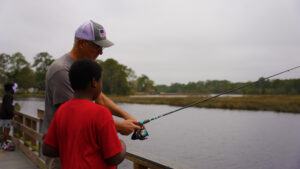 In 2023, St. Johns RIVERKEEPER and LISC Jacksonville launched Resilient Ribault, an initiative to address the challenges facing the waterways and communities in the Ribault River and Moncrief Creek watersheds. We have provided boat tours for residents and stakeholders to experience the Ribault River from the water; advocated for upgrades to riverfront greenspaces, resulting in infrastructure improvements at Riverview Park and Ribault Scenic Drive Park; and launched a water quality initiative to obtain data that will allow us to determine sources of pollution, identify potential solutions, and impel action by local and state agencies.
In 2023, St. Johns RIVERKEEPER and LISC Jacksonville launched Resilient Ribault, an initiative to address the challenges facing the waterways and communities in the Ribault River and Moncrief Creek watersheds. We have provided boat tours for residents and stakeholders to experience the Ribault River from the water; advocated for upgrades to riverfront greenspaces, resulting in infrastructure improvements at Riverview Park and Ribault Scenic Drive Park; and launched a water quality initiative to obtain data that will allow us to determine sources of pollution, identify potential solutions, and impel action by local and state agencies.
Great St. Johns River Cleanup
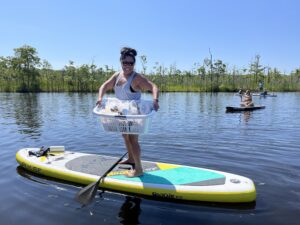 St. Johns Riverkeeper spearheaded a new annual partnership between counties, businesses, and nonprofits throughout the watershed to clean up the St. Johns River and its tributaries during a month-long Great St. Johns River Cleanup, culminating on Earth Day.
St. Johns Riverkeeper spearheaded a new annual partnership between counties, businesses, and nonprofits throughout the watershed to clean up the St. Johns River and its tributaries during a month-long Great St. Johns River Cleanup, culminating on Earth Day.
Reunite the Rivers Coalition
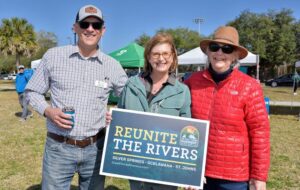 In 2018, we were a founding member of the Reunite the Rivers Coalition which includes 60 organizations representing thousands of members from across Florida and beyond. Our collective mission is to restore a free-flowing Ocklawaha River, reconnecting the Silver and St. Johns Rivers, and elevating the regional benefits for all! Learn more about Reunite the Rivers.
In 2018, we were a founding member of the Reunite the Rivers Coalition which includes 60 organizations representing thousands of members from across Florida and beyond. Our collective mission is to restore a free-flowing Ocklawaha River, reconnecting the Silver and St. Johns Rivers, and elevating the regional benefits for all! Learn more about Reunite the Rivers.
Headwaters Protection & Oversight
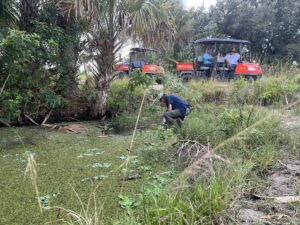 In 2024, we became aware of an unpermitted high-density chicken facility under construction in the headwaters of the St. Johns River in West Indian River County. We partnered with the Clean Water Coalition of Indian River County to urge the Florida Department of Environmental Protection (FDEP) to require protective permits and ensure compliance as required by law. Permitting is now underway while SJRK and other area clean water advocates provide oversight. Learn more about the issue.
In 2024, we became aware of an unpermitted high-density chicken facility under construction in the headwaters of the St. Johns River in West Indian River County. We partnered with the Clean Water Coalition of Indian River County to urge the Florida Department of Environmental Protection (FDEP) to require protective permits and ensure compliance as required by law. Permitting is now underway while SJRK and other area clean water advocates provide oversight. Learn more about the issue.
Clean Water Act Industrial Stormwater Permit Compliance Initiative
We implemented a Clean Water Act Industrial Stormwater Permit Compliance Initiative in partnership with Public Trust for Conservation resulting in a reduction of polluted runoff from six industrial sites. In lieu of fines, the non-compliant facilities can elect to contribute to an environmental fund that was created to provide grants for environmental projects that reduce pollution.
Jacksonville Climate Coalition
 St. Johns Riverkeeper recognizes that in addition to local issues, we must also work to address global climate change as we see sea level rise and rising water temperatures affecting our watershed. Along with other local nonprofit organizations, we helped launch and are a part of the Jacksonville Climate Coalition (JCC), which is actively collaborating with the community to implement ambitious measures aimed at curbing emissions that contribute to heat retention and safeguarding our city against the perils of rising sea levels and perilous heatwaves. Visit the JCC website.
St. Johns Riverkeeper recognizes that in addition to local issues, we must also work to address global climate change as we see sea level rise and rising water temperatures affecting our watershed. Along with other local nonprofit organizations, we helped launch and are a part of the Jacksonville Climate Coalition (JCC), which is actively collaborating with the community to implement ambitious measures aimed at curbing emissions that contribute to heat retention and safeguarding our city against the perils of rising sea levels and perilous heatwaves. Visit the JCC website.
Tributary Pollution
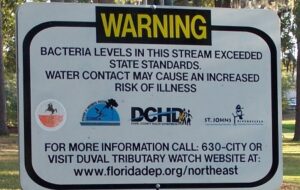 St. Johns Riverkeeper convinced the City of Jacksonville to post health warning signs on some of the most polluted creeks due to high levels of fecal coliform bacteria and called for action by the City and state agencies to improve water quality in the river’s tributaries. Eventually, the state adopted a Basin Action Management Plan (cleanup plan) for 25 polluted tributaries. While some improvements have resulted, Northeast Florida tributaries continue to be plagued with chronic pollution.
St. Johns Riverkeeper convinced the City of Jacksonville to post health warning signs on some of the most polluted creeks due to high levels of fecal coliform bacteria and called for action by the City and state agencies to improve water quality in the river’s tributaries. Eventually, the state adopted a Basin Action Management Plan (cleanup plan) for 25 polluted tributaries. While some improvements have resulted, Northeast Florida tributaries continue to be plagued with chronic pollution.
Condom Creek
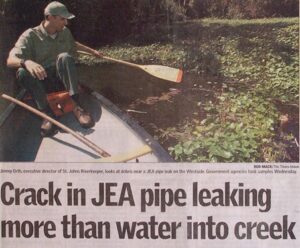 St. Johns Riverkeeper discovered a severe break in a JEA wastewater discharge pipe flowing into the Ortega River. The wastewater contained high levels of bacteria, condoms, and feminine hygiene products. As a result, the pipe replacement was expedited by 14 months, problems at the wastewater treatment facility were quickly repaired, and a settlement was reached that required JEA to fund specific environmental projects to benefit the health of the St. Johns River.
St. Johns Riverkeeper discovered a severe break in a JEA wastewater discharge pipe flowing into the Ortega River. The wastewater contained high levels of bacteria, condoms, and feminine hygiene products. As a result, the pipe replacement was expedited by 14 months, problems at the wastewater treatment facility were quickly repaired, and a settlement was reached that required JEA to fund specific environmental projects to benefit the health of the St. Johns River.
Freedom Commerce Center
 St. Johns Riverkeeper joined the Sierra Club to lead the fight to save the headwaters of Julington and Pottsburg Creeks by preventing the filling of 265 acres of forested wetlands. As a result of our efforts, the developer agreed to reduce the proposed wetland impacts to less than 30 acres and to protect a significant portion of the property. As of today, none of the high-quality wetlands that were originally slated for development have been destroyed.
St. Johns Riverkeeper joined the Sierra Club to lead the fight to save the headwaters of Julington and Pottsburg Creeks by preventing the filling of 265 acres of forested wetlands. As a result of our efforts, the developer agreed to reduce the proposed wetland impacts to less than 30 acres and to protect a significant portion of the property. As of today, none of the high-quality wetlands that were originally slated for development have been destroyed.
The Green Monster
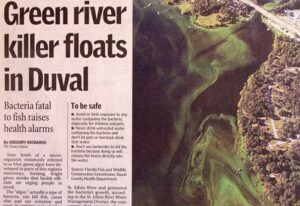 St. Johns Riverkeeper launched a successful River Friendly Yards public awareness campaign to educate homeowners about the impacts of runoff and to provide simple and easy “river-friendly” lawn maintenance and landscaping tips. As part of this campaign, The Green Monster, a television program was produced. It documented the causes and impacts of the massive algae bloom of 2005. Hosted by former Jaguar Jeff Lageman, The Green Monster aired on NBC, was nominated for 3 Emmy Awards, and received first place honors at the national Awards for Reporting on the Environment. Watch the Green Monster documentary.
St. Johns Riverkeeper launched a successful River Friendly Yards public awareness campaign to educate homeowners about the impacts of runoff and to provide simple and easy “river-friendly” lawn maintenance and landscaping tips. As part of this campaign, The Green Monster, a television program was produced. It documented the causes and impacts of the massive algae bloom of 2005. Hosted by former Jaguar Jeff Lageman, The Green Monster aired on NBC, was nominated for 3 Emmy Awards, and received first place honors at the national Awards for Reporting on the Environment. Watch the Green Monster documentary.
State of the River Report
SJRK initiated the creation of the annual Lower St. Johns River State of the River Report, a collaborative project by Jacksonville University and University of North Florida. The first State of the River Report was released in 2008 and continues today, providing a valuable tool for citizens and policymakers to assess the health status of the St. Johns. Read the latest River Report.
Compliance Report
St. Johns Riverkeeper released its first Compliance Report, exposing numerous wastewater permit violations. Soon after its release, DEP Secretary Mike Sole announced that DEP would strengthen its penalty guidelines and would take a tougher stance against the most serious environmental violations. The report also led to a Clean Water Act lawsuit against JEA for continuing violations at its Buckman and Arlington East Wastewater Treatment Facilities. A settlement agreement was eventually reached requiring JEA to develop a plan to reduce Sanitary Sewer Overflows (SSO’s) discharges and hired an independent engineering experts to analyze JEA’s sewage-reduction plan.
Water Wars
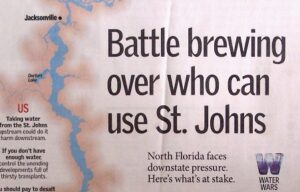 St. Johns Riverkeeper led the effort to prevent plans in Central Florida to remove millions of gallons of water a day from the flow of the St. Johns River and the Ocklawaha River. As a result of widespread public opposition, the St. Johns River Water Management District (SJRWMD) launched a three-year study to better understand the impact of water withdrawals, delayed future permit decisions until completion of the study, and committed more resources and attention to water conservation and reuse programs to solve our water supply problems.
St. Johns Riverkeeper led the effort to prevent plans in Central Florida to remove millions of gallons of water a day from the flow of the St. Johns River and the Ocklawaha River. As a result of widespread public opposition, the St. Johns River Water Management District (SJRWMD) launched a three-year study to better understand the impact of water withdrawals, delayed future permit decisions until completion of the study, and committed more resources and attention to water conservation and reuse programs to solve our water supply problems.
Nutrient Pollution Agreement
St. Johns Riverkeeper and several other environmental groups reached a historic settlement agreement with the federal Environmental Protection Agency (EPA) requiring the state of Florida to adopt measurable limits for the nutrient pollution that is triggering algae blooms and poisoning our waterways. This has resulted in a significant reduction in nitrogen pollution in the Lower Basin of the St. Johns River.
Georgia-Pacific
St. Johns Riverkeeper pressured the Florida Department of Environmental Protection (FDEP) to finally address Georgia-Pacific’s ongoing dioxin problem. As a result, FDEP required the paper mill to remove the most contaminated portion of its settling ponds from its waste stream. While unable to stop the construction of a pipeline by Georgia-Pacific, St. Johns Riverkeeper forced FDEP to issue a much more protective permit that required Georgia-Pacific to take further actions to improve the quality of its effluent.
Rising Tides
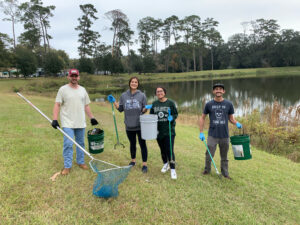 In 2011, St. Johns Riverkeeper launched a new young professionals group, Rising Tides. Rising Tides volunteers have hosted hundreds of fundraising and unique outreach events, empowering the next generation of river advocates. They have received multiple awards from the City of Jacksonville (COJ), including the Environmental Achievement Award from the COJ Environmental Protection Board for their monthly cleanups throughout the McCoys Creek Watershed, which are still happening today. We celebrated 11 consecutive years of McCoys Creek cleanups in December of 2024. Learn more about Rising Tides and get involved.
In 2011, St. Johns Riverkeeper launched a new young professionals group, Rising Tides. Rising Tides volunteers have hosted hundreds of fundraising and unique outreach events, empowering the next generation of river advocates. They have received multiple awards from the City of Jacksonville (COJ), including the Environmental Achievement Award from the COJ Environmental Protection Board for their monthly cleanups throughout the McCoys Creek Watershed, which are still happening today. We celebrated 11 consecutive years of McCoys Creek cleanups in December of 2024. Learn more about Rising Tides and get involved.
Sleepy Creek Lands
St. Johns Riverkeeper and Sierra Club Florida filed a lawsuit opposing a consumptive use water permit for a massive proposed cattle operation that threatened the health of Silver Springs. Public pressure led to the reduction of the original permit request from 13.267 million gallons of water a day (mgd) to 1.46 mgd. While the lawsuit was unsuccessful, the proposed expansion to 9,500 head of cattle never materialized.
Save the St. Johns Tour
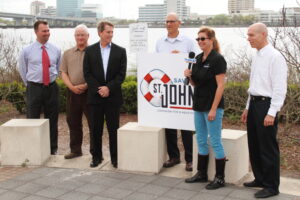 St. Johns Riverkeeper embarked on a 13-day journey of the entire 310-mile length of the St. Johns River to raise awareness about the pollution problems and urgent threats facing the St. Johns, while engaging and activating people and organizations in a collaborative campaign for the river’s protection. The following year eco-tours and paddling trips were organized throughout the St. Johns River watershed to introduce people to the wonders of the St. Johns, show support for clean water and a healthy river, and demonstrate what we stand to lose.
St. Johns Riverkeeper embarked on a 13-day journey of the entire 310-mile length of the St. Johns River to raise awareness about the pollution problems and urgent threats facing the St. Johns, while engaging and activating people and organizations in a collaborative campaign for the river’s protection. The following year eco-tours and paddling trips were organized throughout the St. Johns River watershed to introduce people to the wonders of the St. Johns, show support for clean water and a healthy river, and demonstrate what we stand to lose.
Troubled Waters Documentary
Troubled Waters was released to raise awareness about the significant pollution problems impacting the St. Johns River and most of Florida’s waterways, the politics that are undermining environmental protections, and the impending water crisis that Floridian’s face if we don’t act now. St. Johns Riverkeeper partnered with numerous organizations to host screenings throughout the state. The documentary features local and state politicians, scientists, and leading environmental advocates. Watch the Troubled Waters documentary.
Educational Boat Trip Programs for Students
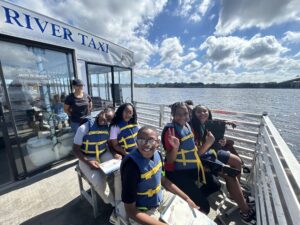 St Johns Riverkeeper has been able to provide standards-based educational boat trips for Duval County Title I students free of charge. In Putnam, we take every second grade student in the county on a boat trip during the annual Bartram Frolic. Additionally, SJRK has provided educational boat tours to school clubs, afterschool programs and other nonprofit student organizations. To date, more than 26,000 kids have benefited from an on-the-water experience on the St. Johns River. We are grateful for generous donations from Constellation Furyk & Friends, CSX and Edna Sproull Williams Foundation that allow us to offer these experiential learning opportunities to local students. Learn more about our unique education programs for students.
St Johns Riverkeeper has been able to provide standards-based educational boat trips for Duval County Title I students free of charge. In Putnam, we take every second grade student in the county on a boat trip during the annual Bartram Frolic. Additionally, SJRK has provided educational boat tours to school clubs, afterschool programs and other nonprofit student organizations. To date, more than 26,000 kids have benefited from an on-the-water experience on the St. Johns River. We are grateful for generous donations from Constellation Furyk & Friends, CSX and Edna Sproull Williams Foundation that allow us to offer these experiential learning opportunities to local students. Learn more about our unique education programs for students.
Water and Land Conservation Amendment 1 Lawsuit
In 2014, Florida voters passed Amendment 1 with 75% of the vote, dedicating 33 percent of net revenue from the existing excise tax on documents to the Land Acquisition Trust Fund. Since that time, the Florida Legislature has ignored the will of the voters, repeatedly failing to appropriately allocate the funds and protect the critical natural lands that remain in our state. As a result, St. Johns Riverkeeper joined with several environmental organizations to sue the Legislature and make sure the funds are used for land conservation. In October 2024, the Supreme Court declined to take up the case, which conservationists first filed in 2015. The groups appealed to the Supreme Court to review a decision by the First District Court of Appeals after the state appealed following a lower court win for conservation.
Save Julington-Durbin Creek Preserve
St. Johns Riverkeeper formed a vocal coalition of organizations and individuals that successfully protected Julington-Durbin Preserve from a developer planning to build 1400 homes in exchange for property on Black Hammock Island. Our coalition collected nearly 6,500 petitions from concerned citizens and submitted a letter to Governor Rick Scott expressing opposition to the proposed land swap and development of the Preserve. Within hours of submitting our letter, the developer announced that he was no longer pursuing his development plans for the Preserve and would work with FDEP to sell the Black Hammock Island property to the state for conservation.
River Rising Campaign
 After local officials failed to take action in the wake of Hurricane Irma, St. Johns Riverkeeper launched a series of River Rising Town Hall meetings to raise awareness about the impacts of dredging and rising waters, spark dialogue about what we need to do to become more resilient, and encourage our leaders to act.
After local officials failed to take action in the wake of Hurricane Irma, St. Johns Riverkeeper launched a series of River Rising Town Hall meetings to raise awareness about the impacts of dredging and rising waters, spark dialogue about what we need to do to become more resilient, and encourage our leaders to act.
The River Rising campaign was a huge success, with more than 800 people attending nine Town Hall events throughout Northeast Florida and thousands of emails and postcards sent to elected leaders asking them to take action now.
Two Jacksonville Task Forces were created that resulted in multiple code changes to provide greater protections for wetlands and low-lying areas adjacent to the River. In addition, a Chief Resilience Officer was hired, a vulnerability assessment was conducted, and a comprehensive Resilient Jacksonville strategy was developed by the City.
Sewage Sludge
St. Johns Riverkeeper has become one of the leading voices in the state regarding the unsustainable management practices of sewage sludge, or biosolids. Over 70% of all of the sewage sludge that is permitted for land application in Florida is being disposed of in our St. Johns River Watershed. That represents more than 89,000 tons of sludge each year.
As a result, high concentrations of phosphorous and other pollutants are running off farm and ranch land, triggering harmful toxic algae blooms. Our advocacy efforts helped lead to a temporary moratorium by the State on the application of biosolids and a proposed rule to reduce the amount of biosolids that can be applied within the river’s watershed.
Waterkeepers Florida
St. Johns Riverkeeper initiated the formal organization of Waterkeepers Florida, with Lisa Rinaman, your St. Johns Riverkeeper, serving as its Chair. The alliance allows the 14 Waterkeeper programs in the state to collaborate on important issues of statewide significance with a unified and more impactful voice. Visit WaterkeepersFlorida.org to learn more.
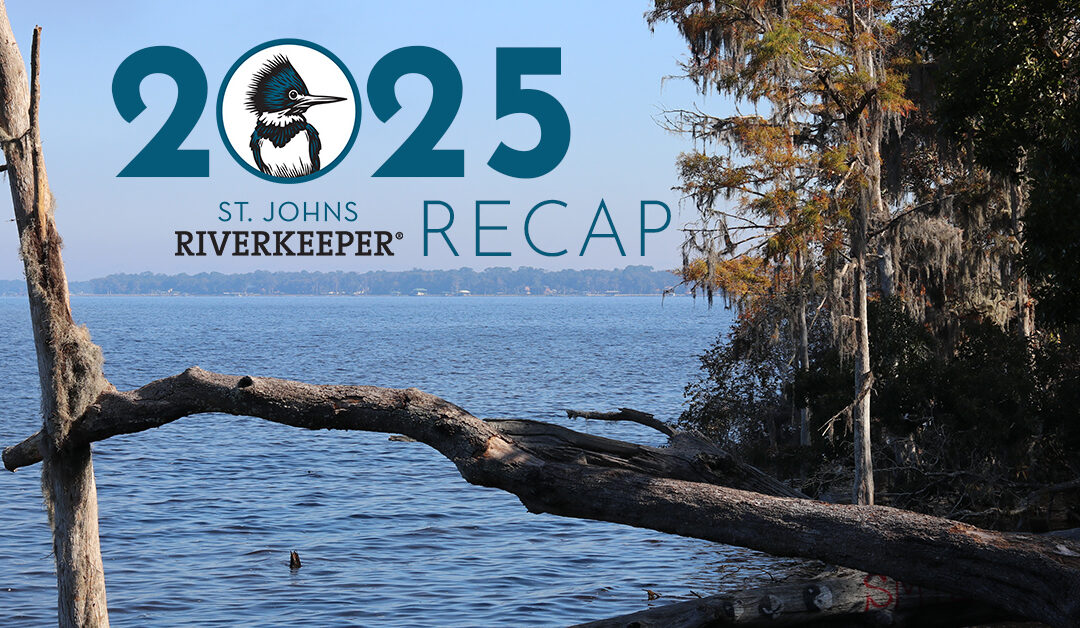
2025 St. Johns Riverkeeper Recap
As we close the door on our milestone 25th anniversary year and look toward the next 25 years, we...
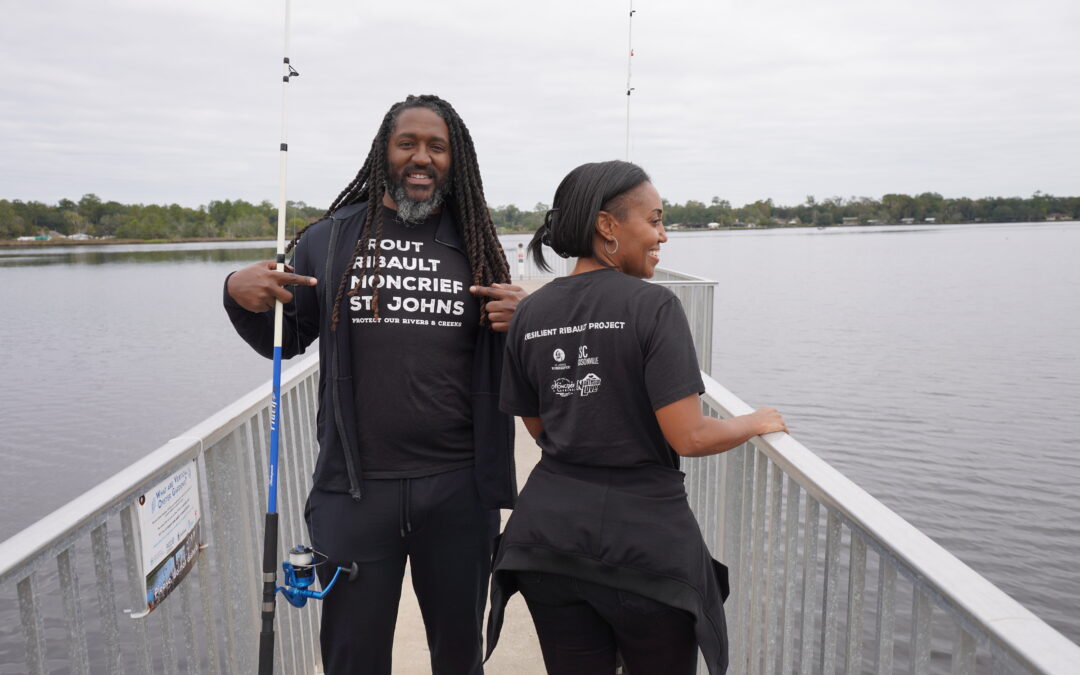
Investing in River Communities: Resilient Ribault Update
Launched in 2023 in partnership with LISC Jacksonville, the Resilient Ribault initiative continues...
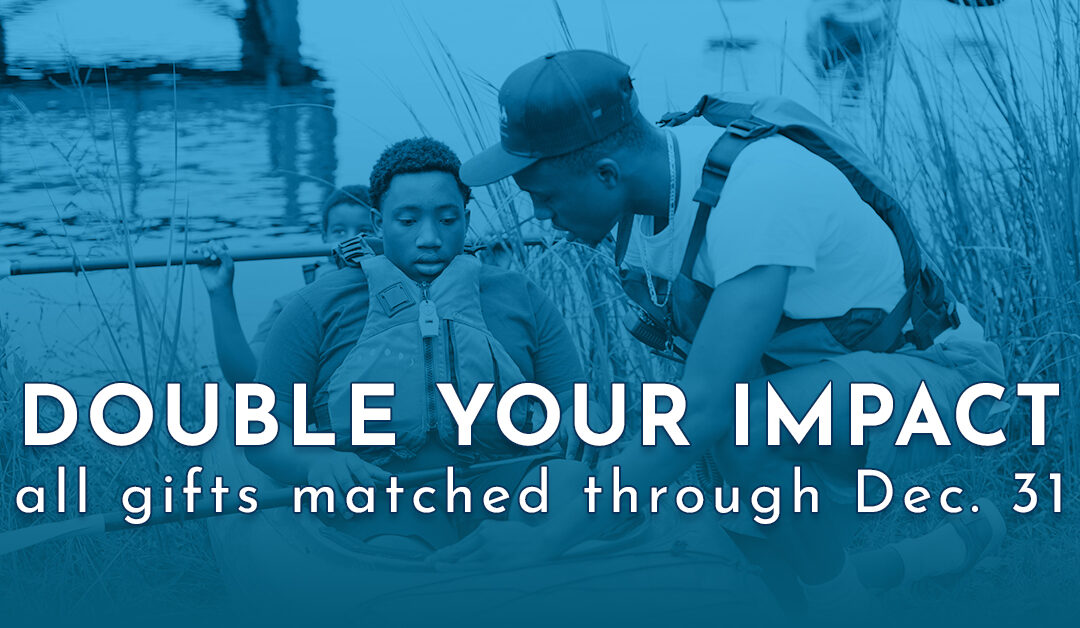
Generous Gift Doubles Year-End Impact
As we close out the year, we are excited to share an opportunity that will shape the future of our...
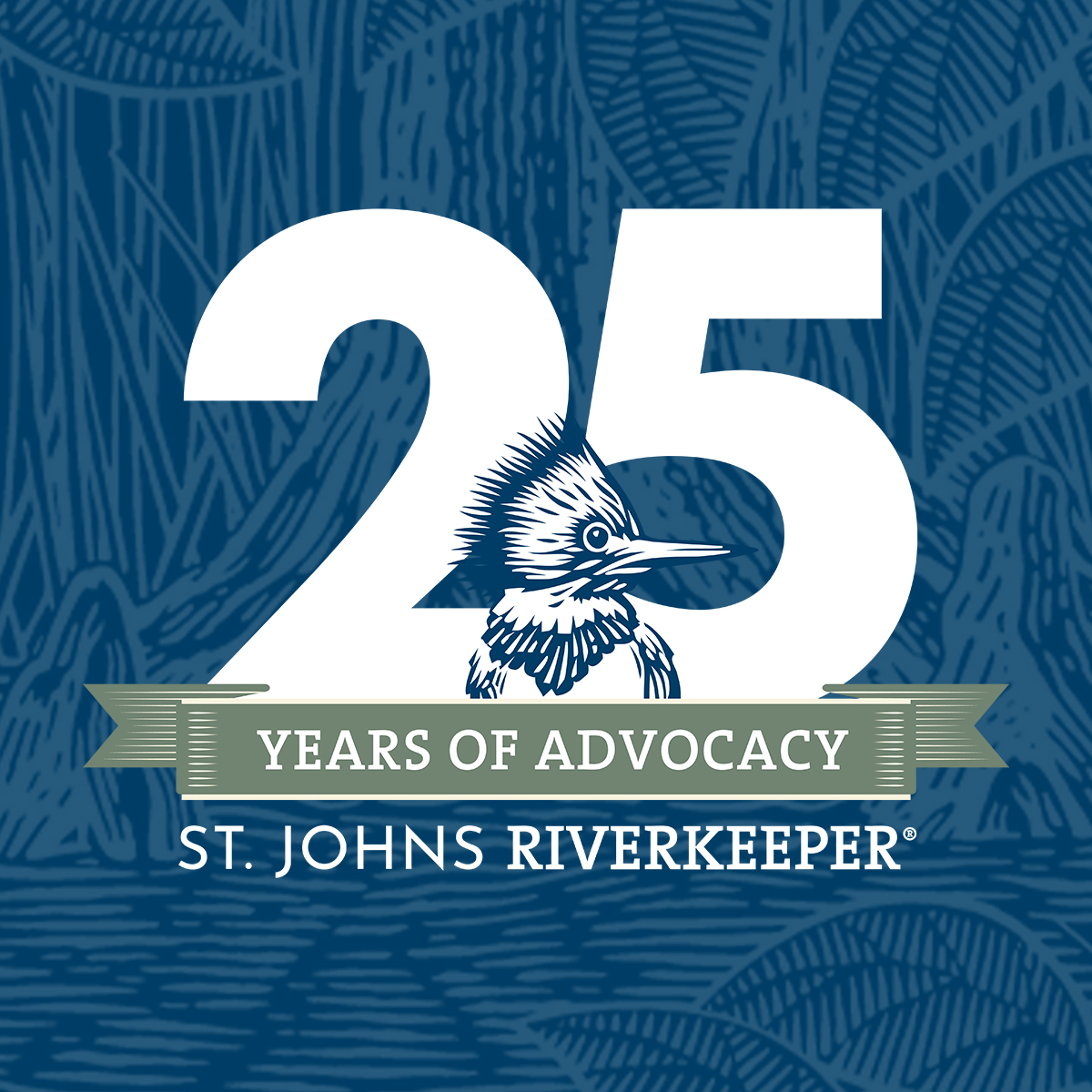
#SJRK25
Celebrate 25 years of St. Johns Riverkeeper. Join us throughout 2025 as we host events to help you Get Your Feet Wet along the St. Johns River watershed, share memories and ambitions for our organization on social media, and become a member of SJRK as we look toward the next 25 years of progress – for the river, and for us all.
